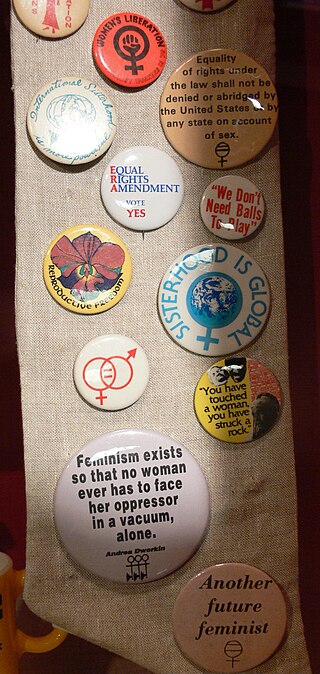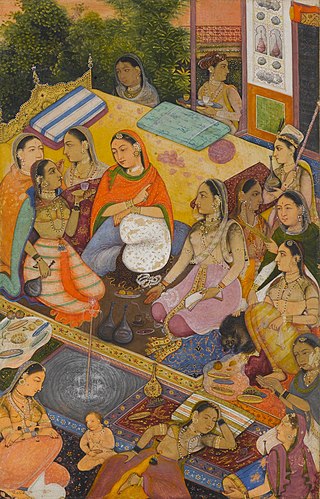Feminism is a range of socio-political movements and ideologies that aim to define and establish the political, economic, personal, and social equality of the sexes. Feminism holds the position that modern societies are patriarchal—they prioritize the male point of view—and that women are treated unjustly in these societies. Efforts to change this include fighting against gender stereotypes and improving educational, professional, and interpersonal opportunities and outcomes for women.

Donna J. Haraway is an American professor emerita in the history of consciousness and feminist studies departments at the University of California, Santa Cruz, and a prominent scholar in the field of science and technology studies. She has also contributed to the intersection of information technology and feminist theory, and is a leading scholar in contemporary ecofeminism. Her work criticizes anthropocentrism, emphasizes the self-organizing powers of nonhuman processes, and explores dissonant relations between those processes and cultural practices, rethinking sources of ethics.

The National University of Ireland, Maynooth, commonly known as Maynooth University (MU), is a constituent university of the National University of Ireland in Maynooth, County Kildare, Ireland. It was Ireland's youngest university until Technological University Dublin was established in 2019, having been founded by the Universities Act, 1997, from the secular faculties of the now separate St Patrick's College, Maynooth, which was founded in 1795. Maynooth is also the only university town in Ireland, all other universities being based within cities.
Women's studies is an academic field that draws on feminist and interdisciplinary methods to place women's lives and experiences at the center of study, while examining social and cultural constructs of gender; systems of privilege and oppression; and the relationships between power and gender as they intersect with other identities and social locations such as race, sexual orientation, socio-economic class, and disability.
The history of feminism comprises the narratives of the movements and ideologies which have aimed at equal rights for women. While feminists around the world have differed in causes, goals, and intentions depending on time, culture, and country, most Western feminist historians assert that all movements that work to obtain women's rights should be considered feminist movements, even when they did not apply the term to themselves. Some other historians limit the term "feminist" to the modern feminist movement and its progeny, and use the label "protofeminist" to describe earlier movements.
Second-wave feminism was a period of feminist activity that began in the early 1960s and lasted roughly two decades, ending with the feminist sex wars in the early 1980s and being replaced by third-wave feminism in the early 1990s. It occurred throughout the Western world and aimed to increase women's equality by building on the feminist gains of the late 19th and early 20th centuries.

St Patrick's Pontifical University, Maynooth, is a pontifical Catholic university in the town of Maynooth near Dublin, Ireland. The college and national seminary on its grounds are often referred to as Maynooth College.

Kate O'Brien was an Irish novelist and playwright.
Anti-abortion feminism is the opposition to abortion by some feminists. Anti-abortion feminists may believe that the principles behind women's rights also call them to oppose abortion on right to life grounds and that abortion hurts women more than it benefits them.

Chicana feminism is a sociopolitical movement, theory, and praxis that scrutinizes the historical, cultural, spiritual, educational, and economic intersections impacting Chicanas and the Chicana/o community in the United States. Chicana feminism empowers women to challenge institutionalized social norms and regards anyone a feminist who fights for the end of women's oppression in the community.
Women have made significant contributions to philosophy throughout the history of the discipline. Ancient examples include Maitreyi, Gargi Vachaknavi, Hipparchia of Maroneia and Arete of Cyrene. Some women philosophers were accepted during the medieval and modern eras, but none became part of the Western canon until the 20th and 21st century, when some sources indicate that Simone Weil Susanne Langer, G.E.M. Anscombe, Hannah Arendt and Simone de Beauvoir entered the canon.
Protofeminism is a concept that anticipates modern feminism in eras when the feminist concept as such was still unknown. This refers particularly to times before the 20th century, although the precise usage is disputed, as 18th-century feminism and 19th-century feminism are often subsumed into "feminism". The usefulness of the term protofeminist has been questioned by some modern scholars, as has the term postfeminist.
Anne Jellicoe, née Anne William Mullin (1823–1880) was a noted Irish educationalist best known for the founding of the prestigious Alexandra College, which became a force in women's education under her management.

Holy Cross College, located on Clonliffe Road, Drumcondra, was founded in 1854 as the Catholic diocesan seminary for Dublin by Paul Cullen, Archbishop of Dublin (later created, in 1866.

A variety of movements of feminist ideology have developed over the years. They vary in goals, strategies, and affiliations. They often overlap, and some feminists identify themselves with several branches of feminist thought.

Women's history is the study of the role that women have played in history and the methods required to do so. It includes the study of the history of the growth of woman's rights throughout recorded history, personal achievements over a period of time, the examination of individual and groups of women of historical significance, and the effect that historical events have had on women. Inherent in the study of women's history is the belief that more traditional recordings of history have minimised or ignored the contributions of women to different fields and the effect that historical events had on women as a whole; in this respect, women's history is often a form of historical revisionism, seeking to challenge or expand the traditional historical consensus.

Ecofeminism is a branch of feminism and political ecology. Ecofeminist thinkers draw on the concept of gender to analyse the relationships between humans and the natural world. The term was coined by the French writer Françoise d'Eaubonne in her book Le Féminisme ou la Mort (1974). Ecofeminist theory asserts a feminist perspective of Green politics that calls for an egalitarian, collaborative society in which there is no one dominant group. Today, there are several branches of ecofeminism, with varying approaches and analyses, including liberal ecofeminism, spiritual/cultural ecofeminism, and social/socialist ecofeminism. Interpretations of ecofeminism and how it might be applied to social thought include ecofeminist art, social justice and political philosophy, religion, contemporary feminism, and poetry.
Chela Sandoval, associate professor of Chicana Studies at University of California, Santa Barbara, is a noted theorist of postcolonial feminism and third world feminism. Beginning with her 1991 pioneering essay 'U.S. Third World Feminism: The Theory and Method of Oppositional Consciousness in the Postmodern World', Sandoval emerged as a significant voice for women of color and decolonial feminism.

Margaret Ó hÓgartaigh was an Irish historian and author.
Evelyn Conlon is an Irish novelist, short story writer, and essayist. Over the course of her career, Conlon has published dozens of novels, short stories, and essays. Her 2003 novel, Skin of Dreams, was shortlisted for Irish Novel of the Year.